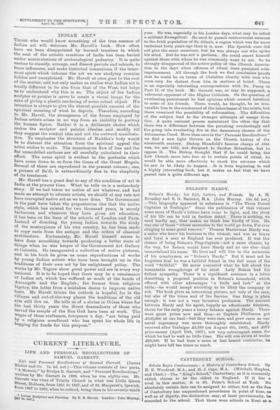CURRENT LITERATURE.
LIFE AND PERSONAL RECOLLECTIONS OF SAMUEL GARRATT.
Life and Personal Recollections of Samuel Garratt. (James Nisbet and Co. 7s. ad. not.)—This volume consists of two parts, " A. Memoir," by Evelyn R. Garratt, and "Personal Recollections," written by Mr. Garratt in 1898, when he was eighty-ono. Mr. Garrett was vicar of Trinity Church in what was Little Queen Street, Holborn, from 1851 to 1867, and of St. Margaret's, Ipswich, from 1807 to 1895, when he retired, being then in his seventy-ninth
• Indian
r Soutpturo and Painting. By E. B. Revell. London : John Murray. .S3 941. net] year. He was, especially in his London days, what may be called a militant Evangelical. He used to preach controversial sermons to the Irish population of St. Gibe's, a region which was far more turbulent forty years ago than it is now. His Ipswich cure did not give the same occasions, but he was always one who spoke his mind. But he was not a partisan. He could assert himself against those with whom he was commonly wont to act. So he strongly disapproved of the active policy of the Church Associa- tion in the days when offences of ritual were punished with imprisonment. All through the book we find conclusive proofs that he could be on terms of Christian charity with men who were very far distant from him in matters of belief. There is an especially interesting correspondence with Dr. Piney in Part II. of the book. Mr. Garrett was, as may be supposed, a vehement opponent of the Higher Criticism. On the question of everlasting punishment he had opinions which seemed heretical to some of his friends. There would, he thought, be an irre- versible loss to the condemned of the inheritance of the saints, but there remained the possibility of reformation. The difficulties of the subject lead to far stranger attempts at escape than this. A quite eminent person maintained the other day that there was a difference between the perishing everlastingly and the going into everlasting fire in the damnatory clauses of the Athanasian Creed. More than once in the " Personal Recollections" we find a new light thrown on the Church history of the nineteenth century. Bishop Blomfield's famous charge of 1841 was, we are told, not designed to further Ritualism, but to oppose it. The Bishop thought that if he could bring the Low Church more into line as to certain points of ritual, he would be able more effectively to chock the advance which he saw to be likely to happen. It is from beginning to end a highly interesting book, but it makes us feel that we have passed into a quite different age.






















































 Previous page
Previous page